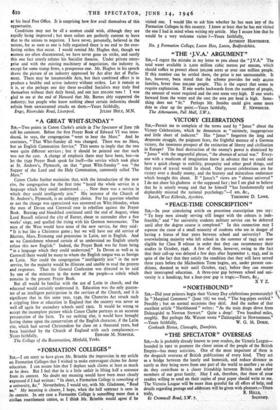" A GREAT WHIT-SUNDAY "
Sra,—Two points in Canon Clarke's article in The Spectator of June 7th call for comment. Before the first Prayer Book of Edward VI was intro-
duced, he says, the congregation " went to hear the Mass." And he continues, " That Whit-Sunday all was changed. There was no Mass, but an English Communion Service." This seems to imply that the two were quite different services ; but it should be pointed out that such
was not the case. A change of emphasis there may have been, but—to let the 1549 Prayer Book speak for itself—the service which took place
at St. Andrew's, Plymouth, on that " great Whit-Sunday " was " the Supper of the Lord and the Holy Communion, commonly called The Mass."
Canon Clarke further maintains that, with the introduction of the new rite, the congregation for the first time " heard the whole service in a language which they could understand. . . . Now there was a service in which they could intelligently join." His instance of the Church of St. Andrew's, Plymouth, is an unhappy choice. For his question whether or not the change was appreciated was answered on Whit-Monday, when the men of Devon and Cornwall rose in rebellion against the Prayer Book. Burning and bloodshed continued until the end of August, when Lord Russell relieved the city of Exeter, about to surrender after a five weeks' siege, and quelled the rising with his German mercenaries. The men of the West would have none of the new service, for they said: " It is but like a Christmas game ; but we will have our old service of Mattins, Mass, Evensong and procession in Latin, not in English. And so we Cornishmen whereof certain of us understand no English utterly refuse this new English." Indeed, the Prayer Book was far from being "in a language which they could understand." In Devon as well as in Cornwall there would be many to whom the English tongue was as foreign as Latin. Nor could the congregation " intelligently join " in the new service, for the majority would be illiterate and unable to read the prayers
and responses. Thus the General Confession was directed to be said by one of the ministers in the name of the people—a rubric which remains in the present Prayer Book.
But all would be familiar with the use of Latin in church, and the educated would certainly understand it. Education was the only guaran- tee of an intelligent participation in the services of the Church, and it is significant that in this same year, 1549, the Chantries Act struck such a crippling blow at education in England that the country was never so well off again for secondary schools until 1902. It would be wrong to accept the incomplete picture which Canon Clarke portrays as an accurate presentation of the facts. To say nothing else, it would have brought
lasting shame upon the conservatism of the English character, if the Latin rite, which had served Christendom for close on a thousand years, had been banished by the Church of England with such complacency.—






























 Previous page
Previous page